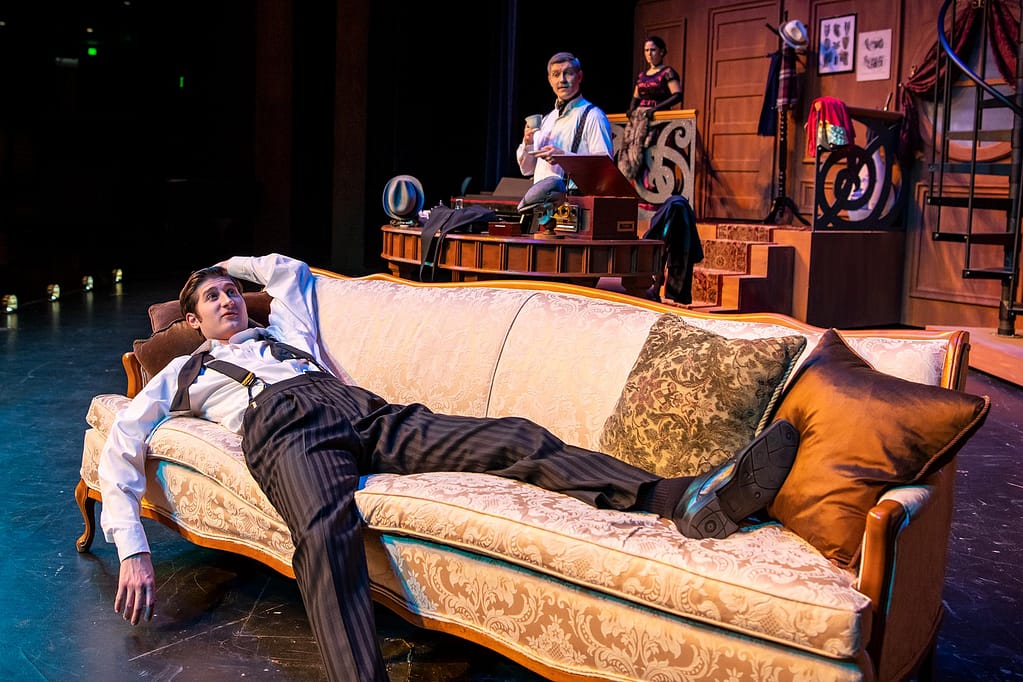“Remember, this is your handkerchief and this is your sleeve. Don’t confuse one for the other,” quipped Professor Henry Higgins, played by Kollin Dembeck (Graduate Assistant), to a wave of laughter during the recent Fine Arts production of Pygmalion.
From cutting humor to large-scale and intricate moveable sets, the cast and crew of talented performers, extras, stage hands, and stage designers pulled together a stunning rendition of George Bernard Shaw’s Pygmalion.
Pygmalion follows Eliza Doolittle, a cockney flower girl with poor speech and poor manners. In the course of the production, renowned linguist Henry Higgins happens upon Eliza and, taking a special interest in her horrendous speech, makes it his goal to create in her a sophisticated, well-mannered lady and pass her off as a duchess at a royal garden party. Under the careful direction of performing arts faculty Daniel Webb, Pygmalion proved to be a classic for the ages.
“We have not performed Pygmalion for Fine Arts since the late ’80s,” Webb explained. “Although it is interesting to note that the actress playing Eliza directed a short version of this play for her master’s recital in the fall of 2013.”
That actress is Hannah Johnston of PCC’s speech faculty. For Johnston, playing the role of Eliza was “a dream role that I’ve loved since I was small. It’s my first real ‘dream role,’ ” she said. “While Higgins is one of my favorite characters from any production, getting to live in the whole Wimpole Street world has been a whirlwind of emotion. This play and these characters have so much of me—what I think and what’s important to me—in their very makeup.”
For some performers, the challenge of using dialects was a hurdle that had to be surmounted. Before this show, I had no formal training with dialects,” said Liz Thomason (Graduate Assistant), assistant director and dialect coach. “When approached with the task to coach actors in dialect, I froze. I had no idea where to begin, but I settled down with a cup of coffee and started researching. I came across a dialect program designed for actors. After locating a dialect program, I began learning the dialects—four of them. Like any other teaching field, I had to master the dialects before I could teach [them].”
After several months of practice, Liz was able to coach the performers through learning Standard RP (British), Cockney, and Scottish accents. The hard work paid off. “Before the show, I could not do a Scottish dialect at all,” said Anna Feo (Sr., MD), who played Higgins’s housekeeper Mrs. Pearce. “But with time and practice I got better at it.”
“I actually found working with my dialect to come easily!” said Kollin Dembeck, who played the grammatically correct Higgins. “My biggest hurdle for this production was the sheer volume of lines, and words are not my strong suit. I tend to make lines much more difficult than they actually are, but in the end the Lord blessed over and abundantly.”
In overcoming personal challenges, the cast communicated the ever-relevant, underlying themes of Pygmalion which resonated with the audience.
“No matter what class of life a person may come from, every person deserves kindness and a chance to be more than what they are,” said Johnston, expressing the intended message.
“Deep down at its core, Pygmalion is a story about respect,” Webb summarized. “Respect is not something that is earned or demanded: respect is given, and given in return. Whatever a person’s origin, situation, or demographic, what makes them worth respect is their humanity—their value in God’s eyes— not an arbitrary sense of value determined by society.”










